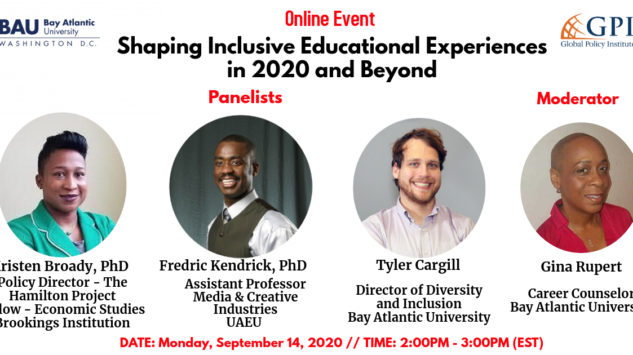Events

How we can improve access to quality education in America
The Global Policy Institute and Bay Atlantic University held a joint webinar on September 14 titled:
Shaping Inclusive Educational Experiences in 2020 and Beyond
Event Summary:
The recent protests and events have made it clear that many American academic institutions have not done enough to provide access to higher education equally to all communities. There is growing awareness across the United States about the built-in inequalities in the American education system. Whether this new focus is due to the COVID 19 pandemic, to protesting for racial justice, or any other combination of factors, the result is the realization that something needs to be done to radically improve access to quality education for marginalized populations. The discussion focused on what actions are being taken or can be taken at every level to constructively address and eliminate the inequalities in the classroom and what the future of a diverse and inclusive education may look like.
All panelists agreed that this crisis exposes even more the ongoing reality of unequal access to quality education in the US. Kendrick pointed out that successful “do it yourself” experiments arranged by better off parents aimed at helping kids with homework cannot be replicated in lower income families in which working parents simply do not have the time, the resources and the academic background to help their kids. Broady pointed out that the need for a good education is now stronger than ever. Low skills jobs are also jobs that require contact with people, this way creating a higher risk of covid contagion for the employees. Beyond that, these low skills jobs in the long run most likely will be eliminated by automation. Hence the value of skills not replaceable by machines that can be acquired only through a good education. Important for schools to work with corporations, so that curricula can be shaped according to their needs.The panelists assessed the ability of US education institutions to cope with the ongoing covid pandemic. Broady stressed the critical importance of functioning education institutions. They provide the tools that allow students to gain skills and gain access to good jobs. Cargill pointed out that schools are having a hard time as they try to cope with this crisis. Besides, teachers are impacted negatively as many of them have been terminated. Kendrick argued that this crisis demonstrates once more how education is important. Americans who lack a good education are hit hard by the pandemic because they work in jobs that require showing up. And they are forced into these jobs because they do not have the qualifications and the skills for professional activities that can be conducted remotely. Broady added that we can see how in this crisis minority schools are doing worse than others. They have access to fewer financial resources. Kendrick added that in many instances the basics are missing. Minority students often do not have internet access. Or it may be low quality. Some charter schools are trying to help their students by distributing tablets. Cargill pointed out that quite often students have phones but they do not have computers. More broadly, many students lack resources at home in terms of support and supervision.
In the context of the pandemic, Kendrick pointed out that inequality is a key “pre-existing condition” in this pandemic. It makes the least educated more likely to be victims. Broady indicated that educators should try their best to be flexible in these unusual circumstances. Do not leave anybody behind. Kendrick added that it is important to retain high academic standards. But professors should focus on guidance, not punishment. Regarding resources, all panelists agreed that more is needed in order to bridge the inequality gap. Cargill pointed out that Bay Atlantic University is doing its best in this regard, by creating generous scholarships that waive 70% of all tuition costs for Washington, DC area students.
Regarding international education, the panelist agreed that even if we went back to normal, to a pre-covid environment, there are still too many restrictions. Hopefully the development of better online courses will help efforts aimed at reaching out to foreign students.
Dr. Fredric Kendrick, Educator, Social Scientist, and Journalist
Dr. Kristen Broady, Policy Director, The Hamilton Project, Fellow – Economic Studies, Brookings Institution
Tyler Cargill, Director of Diversity and Inclusion, Bay Atlantic University
The panel discussion was moderated by BAU Career Counselor Gina Rupert.
Welcoming remarks by Paolo von Schirach, President of The Global Policy Institute, and Chair Political Science and International Relations, Bay Atlantic University